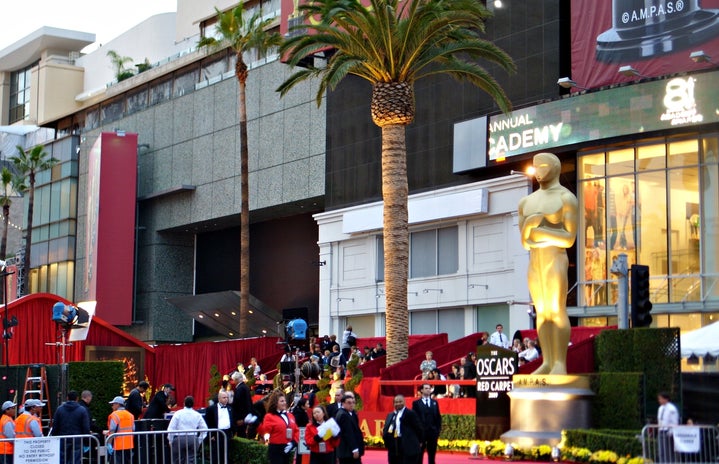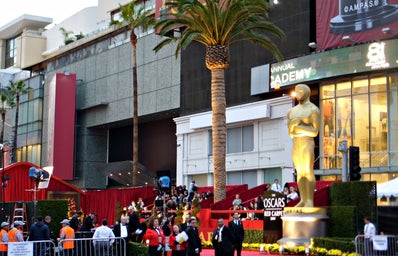The beginning of lockdown across the United States was almost six months ago. Time has started to feel unreal, and looking back to March now feels strange. It’s jarring to think about how different our vision of the future was back then. I thought I’d be back on campus for my last term of university, and my family thought we’d be going on vacation. Quarantine was supposed to be over quickly: follow the rules, wear your mask and stay inside unless absolutely necessary. Now that kind of outlook seems ridiculous. The past several months have been packed with so many life-altering changes, it’s difficult to center in on any one issue alone. However, the early quarantine memory that perhaps feels the most like a fever dream is Gal Gadot’s infamous “Imagine” video.
It was less than a week into most stay at home orders when Gadot and several of her celebrity friends including Sia, Cara Delevigne, Kaia Gerber, Jimmy Fallon and — it pains me to say this — Zoë Kravitz performed a rendition of John Lennon’s “Imagine.” The video was so wildly out of touch, it turned into an overnight meme sensation and became the internet’s punching bag. The sight of super-rich celebrities telling us to “imagine” a better world from their multi-million dollar houses, sitting on easy access to COVID testing and resources that are far out of reach to many people, was as infuriating as it was funny. Especially when there was no sign of any of them donating their money and resources to help in the efforts against COVID-19 in any meaningful way.
Hey celebs, we don’t want to be sung to. We want you to use a million or two of your money and order ventilators, masks, and gloves from the manufacturers then donate them to a hospital. Or pay for the salaries of an entire staff at a bar, restaurant, or daycare. #imagine
— Casey Cipriani (@CaseyCip) March 19, 2020
Shall I tell you what’s not going to make me feel better about being in quarantine or coronavirus? A bunch of millionaires & celebrities singing John Lennon’s “imagine” from their fucking mansions and estates. Piss off
— Scouse Ma (@Scouse_ma) March 19, 2020
Celebrities: Guys we are all in this together, if I can stay home so can you?
Their home: pic.twitter.com/uy3jUiHV3F
— Saboor Alii (@sabooralii) March 25, 2020
Back then, we’d have never guessed that said video would be Gadot’s big summer release, and not Wonder Woman: 1984. Looking back, it was the harbinger of increasingly infuriating, bizarre celebrity blunders throughout the COVID-19 pandemic. Vanessa Hudgens’ remarks about Coachella; Ellen de Generes’ reportedly toxic workplace environment; more drama from the Beauty community on YouTube — these are just a few highlights from the slew of celebrity ‘cancels’ we’ve seen since lockdown started.
This definitely isn’t the first time the internet has come together to deride out of touch celebrity behavior, but it’s becoming increasingly common. We’ve collectively rolled our eyes at the nonsensical celebrity problem that doesn’t fit into the bigger scheme of a global pandemic. The issue probably isn’t that celebrities have magically gotten way worse in the last year. The past several months have been spent witnessing the Black Lives Matter movement dominate media coverage, all while in the lead-up to a general election. Social and political tensions have been pushed to extremes. When real-world events are so serious, minor celebrity blunders seem to stand out even more starkly.
rich white celebrity weighs in on the coronavirus pic.twitter.com/hfpGONgAEm
— mizz frizz (@sophiebonline) March 25, 2020
For one thing, the widespread introduction of social distancing guidelines has introduced a whole new genre of celebrity screw-ups: infuriating stories and pictures of the rich and famous socialising or hanging out without masks. The obvious disregard for public ordinances and safety guidelines is especially grating when regular people are adhering to guidelines despite the upheaval in our own lives, even more so when many people are seriously endangered by other people’s lack of cautiousness.
Watching Shane Dawson, Tati Westbrook, and Jeffree Star rehash their YouTube feuds feels less like cheap entertainment and more like offensive out-of-touch detractions from real issues, made even worse when considering the longstanding histories of racism from Shane and Jeffree.
The last few months have sent the underlying socioeconomic and political tensions that have dictated people’s lives for years to the forefront of our minds. With a pandemic looming over us, the inequality surrounding access to healthcare, housing and resources becomes inarguably transparent. While there’s sadistic amusement in watching their glamorous lifestyles and dramatic feuds, especially when life was “normal,” it creates fissures in a culture that revolves around watching people flaunt their privilege, and unattainable levels of excess. Kanye West announcing his bid for Presidency is less quirky and more terrifying when we’re in the midst of such a fraught election cycle, and other celebrities who’ve made insensitive or ignorant moves in addressing — or indeed, ignoring — BLM seem to have a blatant disregard for the fact that people are dying.
Related: Is Kanye West Really Running for President?
In the past, it’s been easy to look at the rich and famous as either aspirational role models or entertaining performers, whose drama and lifestyle provide escapism from our own.
While so many people in Hollywood are so self-obsessed, I would rather spend my time reading fascinating books ?? pic.twitter.com/tbIV94t6cD
— Mark Ruffalo (@MarkRuffalo) February 7, 2019
We’ve placed them on pedestals where they’re beyond serious critique and examination, by virtue of their inaccessibility. When forced to look past their glamorous characters and recognize them as exploitative employers, irresponsible neighbors or dangerous political figures (the likes of which we’re forced to reckon with in our everyday lives), we have to critique and hold them accountable as we would anyone else.
We’ve reached a point where the media visibility of effects of social and economic disparity have become too glaring and present to overlook, and celebrity culture acts as a constant reminder of the inequality our society is built on. It’s not that we can’t still find comfort in the people we look up to — Taylor Swift’s surprise release of folklore, for example, has been a highlight of lockdown so far. But there’s a difference between finding escapism and comfort in art and in people; the events of 2020 have forced us to remember that celebrities are, in fact, people.
Celebrity culture and capitalism are inextricably entwined. Both elevate the individual over the common good. COVID-19 has shown us how little those who earn the most contribute to society. “We’re all in this together” the rich and powerful have told us. No we’re not.
— Paul Delaney (@coaimpaul) August 16, 2020
If this pandemic has taught us anything, it’s that we must work together and genuinely consider how our actions affect others. I’m not saying that all famous people are bad, or that we all need to unfollow actors, singers, influencers and models on Instagram en masse, but it seems like we’ve realized that celebrities are as human as we are, and shouldn’t be placed on an untouchable pedestal. We don’t have to accept celebrity culture as an unshakeable natural order anymore. The platforms celebrities have are ones we help give them, and it’s important we don’t let all their actions slide by uncriticized with the excuse that it’s just the way they are. Celebrities are beneficiaries of a society that we all have to live within, and it’s in everybody’s best interests to hold them to account and make sure they’re not exploiting or harming the rest of us with their resources and reach. It’s time to hold people to account, and acknowledge inequality in wealth and in privilege as a problem to be solved, not as a fact of life.


